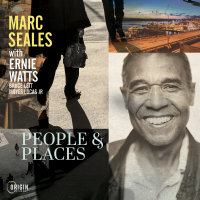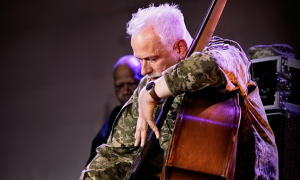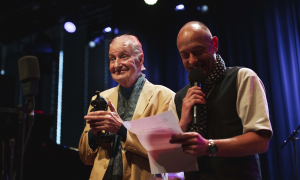Home » Jazz Articles » Profile » Gigi Gryce
Gigi Gryce

Courtesy Mosaic Images
Gigi Gryce was a special kind of musician—the kind often overlooked by the mainstream jazz world today, but widely respected by those familiar with his all too brief time under the jazz spotlight of the 1950s. More often rated as a composer first, and an altoist second, his star burnt brightly in the later be-bop era that gave way to hard bop. Although he was associated with many key musicians of the hard bop school, Gryce's composing and performing was always more lyrically inclined—echoing

Tadd Dameron
piano1917 - 1965
Gryce was born on November 28th, 1925 in Pensacola, Florida. He was christened George General Grice Jr. but soon began to be known as "GG"—hence Gigi. Later on, when he began his professional career, he changed the spelling of his surname to "Gryce." Gryce received lessons from Ray Shepp on clarinet and saxophone at Booker D. Washington High School, and then moved to Hartford. He was conscripted into the U.S. Navy in 1944 and came into contact with a number of jazz-wise shipmates, including Andrew "Goon" Gardner (a friend of Bird's) and thus turned his thoughts away from a career in medicine to a career in jazz.
Gryce embarked on a course of study at the Boston Conservatory of Music in 1947. Majoring in classical composition, his tutors included Alan Hovhaness and Daniel Pinkham. Even before Gryce graduated in 1952, he was gaining the attention of established jazz musicians—arranging for Sabby Lewis, and gigging with visiting artists such as

Howard McGhee
trumpet1918 - 1987

Thelonious Monk
piano1917 - 1982

Stan Getz
saxophone, tenor1927 - 1991
Gryce was still concentrating on his classical compositions and apparently went off to Paris to pursue further musical studies, possibly at the American Conservatoire at Fountainbleau. He may have gone along to classes given by Nadia Boulanger and Arthur Honnegger, but reports of Gryce gaining a Fulbright scholarship are so far unconfirmed. Gryce was reported as having written a couple of symphonies and various chamber works before overwork led to a nervous breakdown, with Gryce returning home before moving to New York. He wrote scores for

Max Roach
drums1925 - 2007
After leaving Dameron's band Gryce joined

Lionel Hampton
vibraphone1908 - 2002

Quincy Jones
arranger1933 - 2024

Clifford Brown
trumpetb.1930

Art Farmer
flugelhorn1928 - 1999

Benny Golson
saxophone, tenor1929 - 2024

Charlie Parker
saxophone, alto1920 - 1955
1954 saw Gryce team up with ex-Hampton band colleague Art Farmer in a quintet that was to record what many enthusiasts believe to be Gryce's best work. The Art Farmer Quintet and When Farmer Met Gryce feature lightly swinging, soulful music, often with exotic harmonies and intriguing structures, but never overblown or overstated—in essence, jazz miniatures. The group disbanded after failing to secure enough regular work to keep the meticulously rehearsed members together—still a depressingly common aspect of jazz, and one which Gryce was not prepared to compromise on.
Gryce was much in demand as a 'first-call' musician and appeared on many memorable sessions, including one with Thelonious Monk (Nica's Tempo), where Gryce's flowing and expressive phrasing free from egotistical cliches, perfectly matched Monk's idiosyncratic approach. As well as composing and performing, Gryce should be remembered for being one of the first musicians to start his own music publishing company—Melotone. Sadly, bucking the trend within a deeply ingrained record and publishing industry proved impossible, and the break up of Gryce's publishing interests affected him deeply, eventually leading to him withdrawing from the jazz scene altogether.
Gryce's desire to experiment with unconventional song structures and instrumentation led to the formation of the appropriately named Jazz Lab in 1957. Co-led by trumpeter

Donald Byrd
trumpet1932 - 2013
As well as alto, Gryce performed on flute, clarinet, piccolo and baritone sax, once putting them all to use on a 1958 Metrojazz album where he multitracked the woodwind parts against a conventionally recorded rhythm section.
Down Beat magazine in 1960 broke the details of what was to be Gryce's last group before abandoning the jazz scene in 1961. Under the title of "A Good Year for Groups," the new Gigi Gryce Quintet introduced the fresh trumpet talent of Richard Williams and also featured Richard Wyands,

Reggie Workman
bassb.1937

Mickey Roker
drums1932 - 2017
Gryce's last album, Reminiscin was recorded early in 1961 and he apparently "went to ground" soon after, suffering from a variety of psychological pressures and strains. He converted to Islam and changed his name to Basheer Qusim. In 1963 he was employed as a "high school orchestra teacher" by the New York Board of Education, and continued in the City of New York Education system (where there exists a school named after his Muslim name) until his death on March 14th, 1983 in the town of his birth, Pensacola.
Gryce's jazz career lasted less than eight years, but the legacy of his music and playing is available through a number of reissued CDs that highlight the important contribution he made to jazz in the 1950s.
Recommended Listening
as sideman:
- Evening in Casablanca -The Art Farmer Quintet -1955 -reissued on Prestige OJCCD-241-2/P-7017
- When Farmer Met Gryce -The Art Farmer Quintet -1955 -reissued on Prestige OJC-072/P-7085
- Clifford Brown Memorial Album -Clifford Brown Sextet -1953 -Blue Note—B21Y-812526-2CD
- Thelonious Monk -Monk's Music -1957-OJC 084
as leader:
- Nica's Tempo -1955 -reissued on Savoy SV-0126
- (with Don Byrd) Don Byrd-Gigi Gryce Jazz Lab/Modern Jazz Perspectives -1957—reissued on Collectables COL-5674

Jackie Paris
vocals1924 - 2004
- The Rat Race Blues -1960 -reissued on Prestige/New Jazz OJCCD-081-2/NJ-8262)
as composer/arranger:
- Buddy Rich and Max Roach -Rich Versus Roach -1959 -Mercury -826 987-2
Tags
Profile
Gigi Gryce
AAJ Staff
Tadd Dameron
Howard McGhee
Thelonious Monk
Stan Getz
Max Roach
Lionel Hampton
Quincy Jones
Clifford Brown
Art Farmer
benny golson
Charlie Parker
Donald Byrd
Reggie Workman
Mickey Roker
Comments
PREVIOUS / NEXT
Support All About Jazz
 All About Jazz has been a pillar of jazz since 1995, championing it as an art form and, more importantly, supporting the musicians who make it. Our enduring commitment has made "AAJ" one of the most culturally important websites of its kind, read by hundreds of thousands of fans, musicians and industry figures every month.
All About Jazz has been a pillar of jazz since 1995, championing it as an art form and, more importantly, supporting the musicians who make it. Our enduring commitment has made "AAJ" one of the most culturally important websites of its kind, read by hundreds of thousands of fans, musicians and industry figures every month.








 Buy Now
Buy Now





















